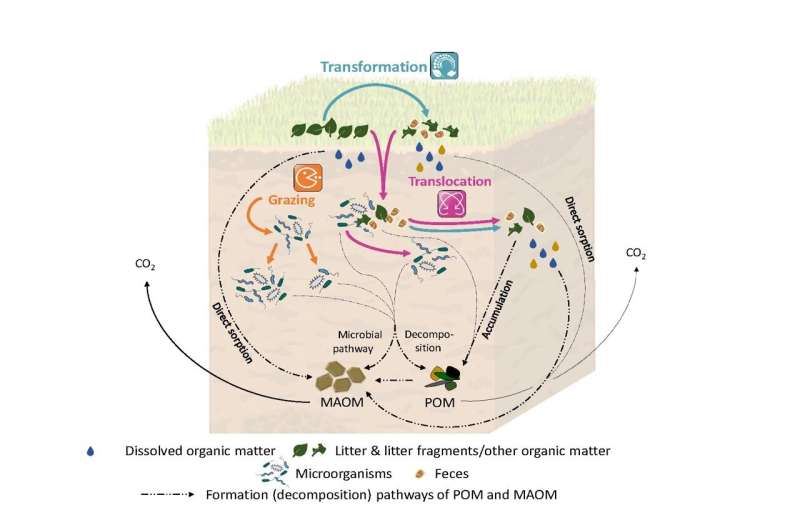This article has been reviewed according to Science X's editorial process and policies. Editors have highlighted the following attributes while ensuring the content's credibility:
fact-checked
peer-reviewed publication
trusted source
proofread
Soil fauna has the potential to fundamentally alter carbon storage in soil, say scientists

The life strategies of a multitude of soil faunal taxa can strongly affect the formation of labile and stabilized organic matter in soil, with potential consequences for how soils are managed as carbon sinks, nutrient stores, or providers of food.
This is the main conclusion of a review led by a team of researchers from the Czech Academy of Sciences, the German Center for Integrative Biodiversity Research (iDiv), Leipzig University, and the Senckenberg Society for Nature Research. Based on a review of more than 180 scientific articles, the authors highlight major pathways by which soil fauna can influence soil organic matter stability, identify knowledge gaps, and suggest future research directions. The study has been published in Nature Communications.
The relevance of soil fauna to soil biogeochemical cycles has well been recognized. However, knowledge on how soil fauna influences the formation of particulate (labile) and mineral-associated organic matter (stabilized for centuries to millennia) and the carbon within is widely lacking.
"We were surprised by the scarcity of studies on how, both mechanistically and quantitatively, soil fauna affects particulate and mineral-associated organic matter, which certainly hampers the development of more effective carbon-focused soil management strategies," says Dr. Gerrit Angst, lead author of the study from the Biology Center of the Czech Academy of Sciences and iDiv.
The international team of authors, comprised of researchers from the Czech Republic, Germany, and France, thus reviewed the literature and conceptualized how multiple soil faunal taxa can alter soil organic matter stability.
The authors highlight the relevance of three major processes—transformation, translocation, and grazing on microorganisms—by which soil fauna alters factors deemed essential in the formation of labile and stabilized soil organic matter.
This includes ingestion of plant residues and chemical and physical alteration of this material before egestion as feces, vertical and horizontal transport of plant residues and organic matter in soil profiles, and changes in microbial community composition and abundance via faunal grazing on microorganisms.
"We strongly emphasize that the processes identified in our review can fundamentally affect the dynamics of particulate and mineral-associated organic matter in soil, while quantitative data, except for earthworms, are virtually absent," explains Angst.
The authors call for coordinated and cross-disciplinary studies on multiple scales and faunal taxa that combine isotopic, microbial, and molecular methods to help close the major identified research gaps.
"Only if we include soil fauna in our concepts and models will we be able to effectively manage soils as carbon sinks, nutrient stores, and providers of food in a rapidly changing environment," concludes Prof Nico Eisenhauer, senior author of the study from iDiv and Leipzig University.
More information: Gerrit Angst et al, Conceptualizing soil fauna effects on labile and stabilized soil organic matter, Nature Communications (2024). DOI: 10.1038/s41467-024-49240-x
Journal information: Nature Communications
Provided by Biology Centre of the Czech Academy of Sciences



















